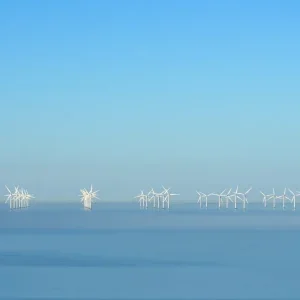
The first stage of heating must be gradual to ensure the containment is thoroughly dry. Once this pilot project is at operating temperatures it will recover stored energy as hot air at 850°C to run the gas turbine.
This is the first time such a device has been built and operated. It is already evident that the burners are very effective and biogas flows will need to be carefully managed to ensure temperatures don’t rise too quickly. When operating temperatures are reached the device will be used to generate electricity for sale to the SA Water plant and the National Electricity Market (NEM). Since the wastewater biogas must be burnt as it is produced, the GAS-TESS must be able to operate continuously, with the ability to both charge the heat store and discharge at the same time. It will therefore provide a continuous supply of hot water from the burners and a second, intermittent, supply when the turbine is operated.
SA Water and 1414 Degrees have partnered to test the commercial model for the GAS-TESS. To do this 1414 Degrees will buy the gas at the market price of methane and sell the electricity at the actual NEM price.
The ability of the GAS-TESS to time shift energy means that 1414 Degrees will operate the turbine to earn the highest NEM price on a daily basis. NEM prices vary daily and seasonally therefore the financial picture will take some time to emerge. The value of the heat in the form of hot water will be assessed using time-dependent gas prices.
The company will report actual revenues and modelled heat value on a quarterly basis.
SA Water plans to compare the value of the GAS-TESS with its current electricity generating engines, which do not allow time shifting to take advantage of peak demand pricing. Even more crucially, SA Water and other utilities will be able to compare operating costs for the two solutions. The GAS-TESS is expected to have much lower operating costs than the current engines which require expensive maintenance and pre-cleaning to counteract the harmful components in the biogas. 1414 Degrees is aiming to prove the commercial case by the end of 2019. Several GAS-TESS units would be needed to replace all current engines and provide redundancy to ensure continuous gas disposal.
Executive Chairman of 1414 Degrees, Dr Kevin Moriarty said that the device had attracted a lot of commercial interest from wastewater treatment utilities looking for a lower treatment cost and time shifting of electricity generation. He added, “There is a huge market in water utilities that are already generating electricity from their biogas and there is an even greater untapped global biogas resource. Although the Glenelg pilot will be earning the first operating revenues for 1414 Degrees, its main value is proving its unique functionality to drive fast growth of sales and services in 2020 and beyond.”
Source: Company Press Release.






